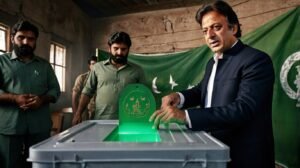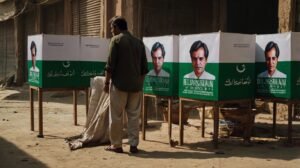
Introduction
As Pakistan approaches its upcoming elections, the atmosphere is charged with anticipation, hope, and a fair amount of uncertainty. This electoral process is not merely a political formality; it represents a significant opportunity for the nation to redefine its future. With pressing challenges ranging from economic instability to social unrest, the stakes have never been higher. Citizens will soon have the opportunity to make choices that will shape their lives in the years to come.
At zaroraterishta.com, we believe that informed citizens are empowered citizens. This article aims to provide a comprehensive overview of the key issues at play, the candidates vying for power, and the implications of the upcoming elections for the people of Pakistan.
Historical Context
To appreciate the significance of the upcoming elections, we must reflect on Pakistan’s historical context. Since its independence in 1947, the country has traversed a tumultuous political landscape marked by military coups, democratic transitions, and ongoing struggles for civilian governance.
The Evolution of Democracy in Pakistan
Pakistan’s political history is characterized by alternating periods of military rule and civilian governance. The struggle for democracy has been fraught with challenges, including political instability, corruption, and social divisions. Understanding this backdrop is crucial for evaluating the current political climate:
– **Military Regimes**: Pakistan has witnessed multiple military takeovers, with leaders like General Zia-ul-Haq and General Pervez Musharraf imposing martial law. These regimes often curtailed democratic processes and civil liberties, fostering a legacy of mistrust toward military influence in politics.
– **Democratic Transitions**: In recent decades, Pakistan has made significant strides toward democratic governance. The return of civilian rule in the late 2000s marked a turning point, with increased political participation and a focus on strengthening democratic institutions.
– **Challenges to Democracy**: Despite progress, the road to democracy has been rocky. Issues such as corruption, electoral fraud, and political violence have hindered the effectiveness of democratic governance. The upcoming elections present an opportunity for citizens to demand accountability and transparency from their leaders.

Key Historical Elections
Several elections have significantly shaped Pakistan’s political landscape:
– **1970 General Election**: This was the first general election held based on direct voting. It resulted in the rise of the Awami League in East Pakistan, leading to political tensions that eventually culminated in the secession of East Pakistan and the creation of Bangladesh.
– **2008 General Election**: Following the assassination of former Prime Minister Benazir Bhutto, the 2008 elections marked a transition back to civilian rule. The Pakistan Peoples Party (PPP) emerged victorious, leading to significant changes in governance and policy direction.
– **2018 General Election**: The 2018 elections saw the rise of the Pakistan Tehreek-e-Insaf (PTI), led by Imran Khan, who campaigned on a platform of anti-corruption and economic reform. This election was marked by allegations of rigging and manipulation, raising concerns about the integrity of the electoral process.
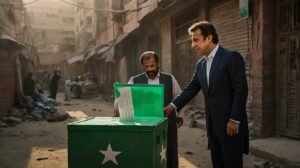
Key Issues Facing Pakistan
As Pakistan prepares for its elections, several pressing issues will dominate the political discourse. These challenges impact the lives of millions and will influence voters’ decisions at the polls.
Economic Instability
One of the most critical issues facing Pakistan is its economic instability. The country has grappled with rising inflation, a burgeoning fiscal deficit, and mounting debt. Understanding the economic landscape is essential for voters:
– **Rising Inflation**: Inflation has surged in recent years, resulting in skyrocketing prices for essential goods. Citizens are feeling the pinch as their purchasing power diminishes, leading to increased discontent. According to recent reports, inflation rates have reached historic highs, with food prices being particularly affected.
– **Unemployment**: The job market has struggled to keep pace with the growing population, leading to high unemployment rates, particularly among youth. The lack of job opportunities fuels frustration and disillusionment, making economic recovery a top priority for voters.
– **Debt Crisis**: Pakistan’s mounting debt burden poses a significant challenge. The government’s reliance on international loans has raised concerns about economic sovereignty and the long-term sustainability of fiscal policies. Candidates must articulate plans to address the debt crisis while promoting economic growth.
Security Concerns
Security is another critical issue that shapes the political landscape in Pakistan. The country has faced threats from terrorism, sectarian violence, and regional instability. Voters are keenly aware of security challenges:
– **Terrorism**: Pakistan has battled terrorism for decades, resulting in loss of life and displacement of communities. The rise of extremist groups poses ongoing threats to national security. Candidates will need to present comprehensive strategies to counter extremist ideologies and enhance national security.
– **Regional Tensions**: The ongoing tensions with neighboring India, particularly over the Kashmir issue, continue to be a source of concern. Voters are looking for candidates who can navigate these complex geopolitical dynamics while prioritizing peace and stability.
Social Issues
Social issues, including education, healthcare, and gender equality, are vital considerations for voters. The upcoming elections provide an opportunity for candidates to address these challenges:
– **Education**: Pakistan faces a significant education crisis, with millions of children out of school. According to UNICEF, Pakistan has one of the highest rates of out-of-school children in the world. Candidates must prioritize education reform to ensure access to quality education for all, particularly marginalized communities.
– **Healthcare**: The healthcare system in Pakistan struggles with inadequate infrastructure and limited access to services. Voters are seeking candidates who can commit to improving healthcare delivery and ensuring affordable access to medical care.
– **Gender Equality**: Women in Pakistan continue to face discrimination and violence. Addressing gender inequality and empowering women will be crucial for candidates looking to garner support from progressive voters. Initiatives to combat domestic violence and promote women’s rights are essential topics for discussion.
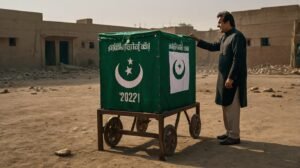
Environmental Challenges
The impact of climate change and environmental degradation is becoming increasingly critical in Pakistan. Candidates must address the following:
– **Climate Change**: Pakistan is among the countries most affected by climate change, facing extreme weather events, floods, and droughts. Policies aimed at environmental sustainability and disaster management are essential for safeguarding vulnerable communities.
– **Water Scarcity**: Water scarcity is a growing concern, exacerbated by climate change and population growth. Candidates should propose effective water management strategies to ensure access to clean water for all citizens.
– **Pollution**: Urban areas in Pakistan are grappling with pollution, which poses health risks to citizens. Addressing air and water pollution will be crucial for improving public health outcomes.
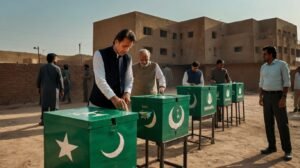
Key Players and Candidates
As the elections draw near, various political parties and candidates are positioning themselves to win the trust of the electorate. Understanding the major players is essential for voters:
Pakistan Tehreek-e-Insaf (PTI)
The Pakistan Tehreek-e-Insaf (PTI), led by former Prime Minister Imran Khan, has emerged as a significant political force in recent years. Khan’s tenure was marked by promises of anti-corruption measures and economic reforms.
– **Imran Khan’s Leadership**: Khan’s leadership has been polarizing, with supporters praising his vision for a “Naya Pakistan” and critics citing failures in governance. His ability to connect with youth and grassroots supporters will be crucial in the upcoming elections.
– **Party Platform**: PTI’s platform focuses on economic reforms, social justice, and combating corruption. Candidates from PTI will need to articulate their plans clearly to resonate with voters facing economic hardships.
– **Challenges Ahead**: The party faces criticism for its handling of economic issues, and maintaining public support will be essential for its success in the elections.
Pakistan Muslim League-Nawaz (PML-N)
The Pakistan Muslim League-Nawaz (PML-N), led by Shahbaz Sharif, is another key player in the electoral landscape. The party has a strong support base in Punjab, Pakistan’s most populous province.
– **Sharif’s Agenda**: Shahbaz Sharif aims to build on the legacy of his brother, Nawaz Sharif, who served as Prime Minister multiple times. PML-N’s focus on infrastructure development and economic stability will be central to their campaign.
– **Challenges Ahead**: The party faces scrutiny over previous governance issues, including allegations of corruption. PML-N candidates must address these concerns while presenting a credible vision for the future.
Pakistan Peoples Party (PPP)
The Pakistan Peoples Party (PPP), led by Bilawal Bhutto Zardari, remains a significant political force, particularly in Sindh province. The party seeks to revive its influence at the national level.
– **Bhutto’s Vision**: Bilawal Bhutto Zardari aims to connect with younger voters while honoring his family’s political legacy. The PPP’s platform emphasizes social justice, democratic governance, and economic empowerment.
– **Challenges in Relevance**: The party faces challenges in maintaining relevance amid changing political dynamics. Candidates will need to appeal to a broader electorate beyond their traditional stronghold.
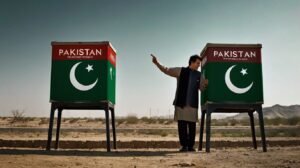
Emerging Parties and Candidates
In addition to established parties, emerging political movements and independent candidates are gaining traction. These new voices may disrupt traditional voting patterns:
– **New Political Movements**: Grassroots movements advocating for issues such as climate change, social justice, and anti-corruption are gaining momentum. These movements represent a shift in voter priorities and may attract younger voters disillusioned with traditional parties.
– **Independent Candidates**: Independent candidates are emerging as potential disruptors, especially in constituencies where voters seek alternatives to established parties. Their ability to connect with local communities and address specific concerns will be crucial.
Voter Engagement and Mobilization
As the elections approach, voter engagement becomes paramount. Understanding how candidates plan to mobilize support is essential for assessing their chances of success.
Grassroots Campaigning
Candidates are increasingly focusing on grassroots campaigning to connect with voters on a personal level. This approach involves:
– **Community Engagement**: Candidates are hosting town hall meetings, community events, and door-to-door campaigns to engage directly with constituents. Building personal connections can foster trust and loyalty among voters.
– **Youth Outreach**: With a significant portion of the electorate comprising young voters, candidates are tailoring their messages to resonate with this demographic. Utilizing social media platforms and youth-centric events is crucial for reaching a tech-savvy audience.
Social Media Strategies
In the digital age, social media plays a pivotal role in shaping political narratives. Candidates are leveraging platforms like Twitter, Facebook, and Instagram to:
– **Share Campaign Messages**: Candidates are using social media to disseminate their platforms, engage with voters, and counter misinformation. Effective communication through digital channels can expand their reach and influence.
– **Mobilize Supporters**: Social media campaigns are being employed to mobilize supporters, encouraging them to participate in rallies, events, and voter registration drives. Engaging online communities can amplify a candidate’s message.
Addressing Voter Concerns
Candidates must address voter concerns genuinely to earn their trust. Key strategies include:
– **Listening to Constituents**: Candidates who actively listen to the concerns and aspirations of their constituents are more likely to build strong support. Engaging in meaningful dialogue demonstrates a commitment to serving the community.
– **Transparency and Accountability**: Voters are increasingly demanding transparency from their leaders. Candidates who openly discuss their plans, acknowledge challenges, and hold themselves accountable for their actions may earn greater respect from the electorate.
What’s at Stake for Pakistan
The outcome of the upcoming elections will have profound implications for Pakistan’s future. Understanding what’s at stake is essential for voters:
Economic Recovery
The new government will face the immediate challenge of steering the country toward economic recovery. Key considerations include:
– **Job Creation**: The elected leaders must prioritize job creation and economic growth to address unemployment and improve living standards. Policies that support small businesses and entrepreneurship will be crucial.
– **Fiscal Responsibility**: Addressing the debt crisis and ensuring fiscal responsibility are vital for long-term economic stability. Candidates’ proposals should focus on sustainable budgeting and reducing reliance on foreign loans.
Democratic Governance
The elections are an opportunity to strengthen democratic governance in Pakistan. Key factors include:
– **Strengthening Institutions**: The new government must work to strengthen democratic institutions, including the judiciary, electoral bodies, and law enforcement agencies. Upholding the rule of law and promoting accountability are essential for restoring public trust.
– **Protecting Civil Liberties**: Protecting civil liberties and human rights is a cornerstone of democracy. Elected leaders must commit to safeguarding freedom of expression, assembly, and the press, ensuring an inclusive society where diverse voices are heard.
Social Progress
The elections present a chance to advance social progress in Pakistan. Key areas of focus include:
– **Education Reform**: Investing in education and ensuring access to quality schooling for all children is crucial for long-term societal development. The new government must prioritize education policies that empower the next generation.
– **Healthcare Access**: Addressing healthcare disparities and improving access to medical services is vital for the well-being of citizens. Candidates must present plans to enhance healthcare delivery and ensure affordability.
– **Gender Equality**: Promoting gender equality and empowering women are essential for a just society. The new government should commit to policies that address violence against women and promote equal opportunities in education and employment.
Environmental Challenges
The impact of climate change and environmental degradation is becoming increasingly critical in Pakistan. Candidates must address the following:
– **Climate Change**: Pakistan is among the countries most affected by climate change, facing extreme weather events, floods, and droughts. Policies aimed at environmental sustainability and disaster management are essential for safeguarding vulnerable communities.
– **Water Scarcity**: Water scarcity is a growing concern, exacerbated by climate change and population growth. Candidates should propose effective water management strategies to ensure access to clean water for all citizens.
– **Pollution**: Urban areas in Pakistan are grappling with pollution, which poses health risks to citizens. Addressing air and water pollution will be crucial for improving public health outcomes.
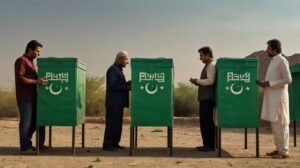
The Role of Media in Elections
The media plays a crucial role in shaping public perception and influencing voter behavior during elections. Understanding the media landscape in Pakistan is essential for grasping the dynamics of the electoral process.
Traditional Media
Traditional media, including television and newspapers, continues to play a significant role in informing the public about candidates, policies, and election-related news. Key points include:
– **Television News**: Television remains a primary source of news for many Pakistanis. Political talk shows and debates provide platforms for candidates to present their views and engage with the electorate.
– **Print Media**: Newspapers and magazines contribute to the political discourse by providing analysis, opinion pieces, and coverage of campaign events. Investigative journalism can hold candidates accountable for their actions and promises.
Digital Media
The rise of digital media has transformed the electoral landscape in Pakistan. Social media platforms, news websites, and online forums have become essential for candidates to reach voters. Key aspects include:
– **Social Media Campaigns**: Candidates are increasingly utilizing social media to engage with voters, share their messages, and counter misinformation. Platforms like Facebook and Twitter allow for real-time interaction and feedback.
– **Influencer Impact**: Social media influencers and bloggers can significantly impact public opinion. Candidates may collaborate with popular figures to reach younger audiences and enhance their visibility.
Challenges and Misinformation
While the media plays a vital role in elections, challenges such as misinformation and media bias can undermine the electoral process:
– **Misinformation**: The spread of false information and fake news can distort public perception and influence voter behavior. Candidates must be vigilant in combating misinformation and ensuring their messages are accurate.
– **Media Bias**: Perceived bias in media coverage can lead to a lack of trust in traditional news sources. Candidates may need to navigate a complex media landscape and effectively communicate their platforms to counter negative narratives.
Voter Education and Participation
Voter education is crucial for fostering an informed electorate. Understanding the electoral process, candidates, and key issues empowers citizens to make informed choices.
Importance of Voter Education
Educating voters about their rights, the voting process, and candidate platforms is essential for promoting active participation. Key strategies include:
– **Awareness Campaigns**: Organizations and civil society groups can conduct awareness campaigns to inform citizens about the importance of voting and how to participate effectively.
– **Voter Guides**: Providing easy-to-understand voter guides that outline candidates’ positions on key issues can help voters make informed decisions at the polls.
Encouraging Voter Participation
Increasing voter turnout is crucial for a healthy democracy. Strategies to encourage participation include:
– **Accessible Voting**: Ensuring that polling stations are accessible and that voting procedures are straightforward can help increase voter turnout. Candidates should advocate for measures that facilitate the voting process.
– **Engaging Communities**: Candidates can engage with local communities to mobilize support and encourage voter participation. Grassroots efforts can inspire citizens to exercise their right to vote.
## Potential Outcomes and Predictions
As the elections approach, political analysts and citizens alike are speculating about potential outcomes and their implications for Pakistan’s future. Understanding these scenarios can help voters prepare for the consequences of their choices.
Scenario 1: PTI Retains Power
If the PTI, led by Imran Khan, retains power, the party will face the challenge of delivering on its promises amid economic difficulties. Key implications include:
– **Continued Reforms**: The PTI may continue its push for economic reforms and anti-corruption measures. However, the government will need to demonstrate tangible results to maintain public support.
– **Public Discontent**: If economic issues persist, public discontent may grow, leading to protests and calls for accountability. The government will need to address citizens’ concerns to prevent unrest.
Scenario 2: PML-N Returns to Power
If the PML-N, led by Shahbaz Sharif, wins the elections, the party will need to navigate its legacy and regain public trust. Possible outcomes include:
– **Focus on Development**: The PML-N may prioritize infrastructure development and economic stability, leveraging its experience in governance. However, it will need to address past allegations of corruption to gain credibility.
– **Opposition Challenges**: The PML-N may face challenges from opposition parties, particularly if it fails to address pressing economic and social issues. Maintaining a united front within the party will be crucial.
Scenario 3: Emergence of New Players
The rise of emerging parties and independent candidates could disrupt traditional voting patterns. Key implications include:
– **Shifts in Power Dynamics**: Emerging parties may capture significant portions of the electorate, leading to a more fragmented political landscape. This could result in coalition governments and necessitate compromises on policy matters.
– **Youth Engagement**: New players may resonate with younger voters seeking change. Their ability to articulate progressive agendas and address contemporary issues could reshape the political discourse.
Post-Election Challenges
Regardless of the election outcome, the new government will face several challenges that will require immediate attention:
Economic Recovery
The new leadership will need to prioritize economic recovery amidst widespread dissatisfaction. Strategies may include:
– **Creating Job Opportunities**: The new government must implement policies that stimulate job creation, particularly in sectors such as technology, agriculture, and manufacturing.
– **Attracting Foreign Investment**: To boost economic growth, attracting foreign investment will be crucial. The government may need to create a conducive environment for businesses, including regulatory reforms and incentives.
Strengthening Institutions
Building robust democratic institutions will be vital for ensuring the stability and effectiveness of governance. This includes:
– **Judicial Independence**: Strengthening the independence of the judiciary is essential for upholding the rule of law and ensuring accountability.
– **Electoral Reforms**: Addressing concerns about electoral integrity will be crucial for restoring public trust in the democratic process. Reforms may include improving the transparency of election procedures and implementing measures to prevent fraud.
Social Cohesion
Promoting social cohesion and addressing divisions within society will be critical for national stability. Strategies may include:
– **Promoting Inclusivity**: The new government should prioritize policies that promote inclusivity and representation for marginalized communities, including ethnic and religious minorities.
– **Encouraging Dialogue**: Facilitating dialogue among different political factions and societal groups can help bridge divides and foster a sense of unity.
Conclusion
As Pakistan approaches its upcoming elections, the stakes are high, and the future of the nation hangs in the balance. With pressing issues such as economic instability, security concerns, and social progress at the forefront, voters are faced with critical choices that will shape their lives for years to come.
It is imperative for citizens to engage actively in the electoral process, holding candidates accountable for their promises and demanding transparency and accountability. As zaroraterishta.com emphasizes, informed citizens are empowered citizens, and understanding the key issues at stake is essential for making informed decisions.
The upcoming elections represent a pivotal moment for Pakistan—a chance to forge a new path toward prosperity, democracy, and social justice. The choices made at the ballot box will determine not only the direction of the government but the future of the nation itself.
Detailed FAQs – Pakistan’s Upcoming Elections: What’s at Stake?
1. What makes the 2024 elections significant for Pakistan?
These elections offer a chance for voters to address economic instability, political accountability, and social reforms, shaping Pakistan’s direction.
2. Who are the major political players in the upcoming elections?
Key contenders include PTI led by Imran Khan, PML-N led by Shahbaz Sharif, and PPP led by Bilawal Bhutto Zardari, alongside emerging parties and independents.
3. What are the top issues influencing voter sentiment?
Voters are concerned about inflation, unemployment, healthcare, education, corruption, terrorism, and climate-related disasters like floods and droughts.
4. How has Pakistan’s electoral history influenced today’s political landscape?
From military regimes to flawed democracies, past elections have shaped citizens’ skepticism and desire for transparent, civilian-led governance.
5. How does economic instability impact voter priorities?
With rising inflation and debt, economic recovery tops voter concerns. Citizens seek job creation, price stability, and sustainable fiscal reforms.
6. What role does youth play in this election?
With a large portion of Pakistan’s population under 30, youth engagement via social media and grassroots movements could shift election outcomes.
7. What is the role of the military in this election?
The military has historically influenced Pakistan’s politics. Voters and analysts are watching closely for signs of interference or support.
8. How are social issues like education and gender equality shaping debates?
Voters demand quality education, affordable healthcare, and stronger protections for women. These issues are central to many party platforms.
9. Can new political movements disrupt traditional party dominance?
Yes. Grassroots and issue-based movements are gaining support, especially among urban and youth voters seeking alternatives to status quo parties.
10. How should voters prepare to make an informed decision?
By understanding key issues, scrutinizing candidate platforms, verifying news sources, and participating in civic dialogue to promote democratic values.

